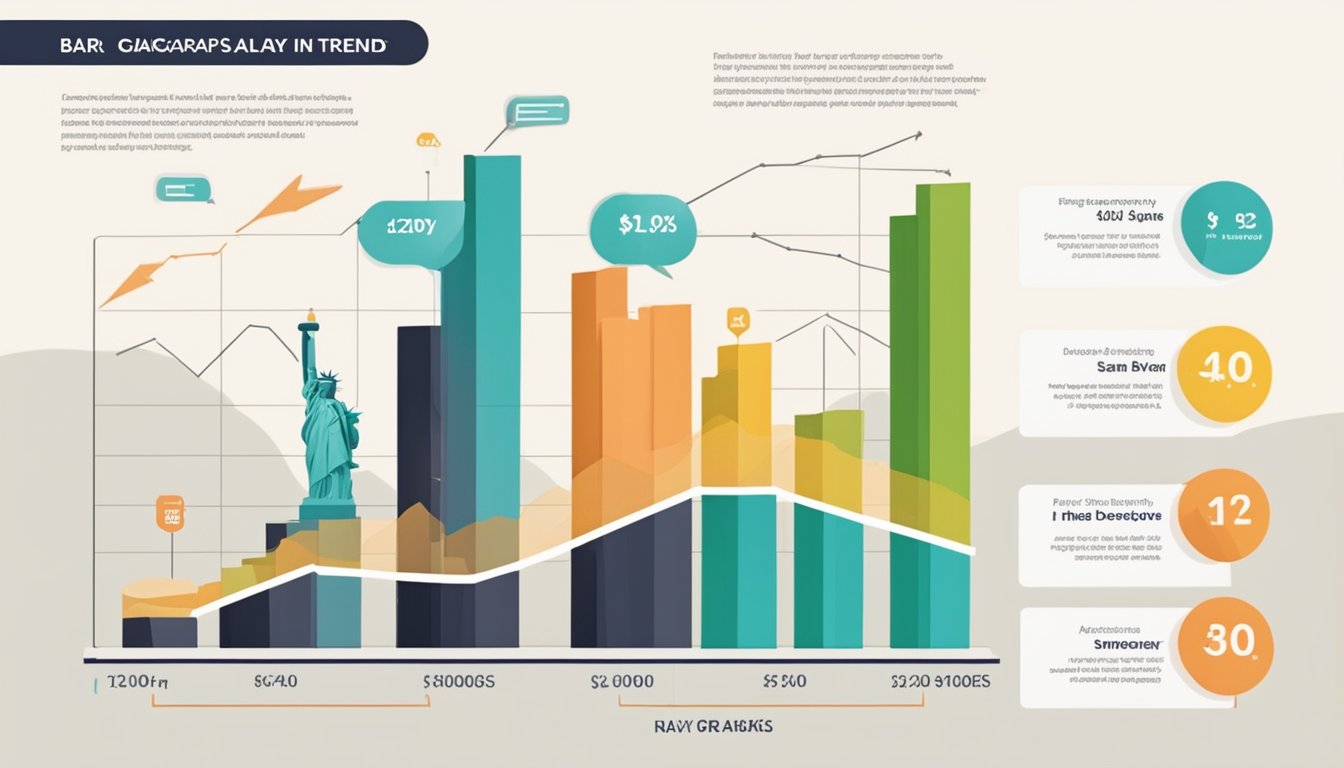Are you curious about how much you should be earning in Singapore? Do you want to know if you’re being paid fairly? If so, you’re not alone. Many people are unsure about what their salary should be, especially in a city with such a high cost of living. That’s where the Singapore Salary Guide comes in.

The Singapore Salary Guide is a comprehensive resource that provides information on average salaries for various professions in Singapore. It can help you determine whether you’re being paid fairly, and it can also give you an idea of what you can expect to earn in the future. With the guide, you’ll be able to negotiate your salary with confidence and make informed decisions about your career.
The guide includes information on salaries for a variety of industries, including finance, healthcare, and technology. It also includes data on salaries for different levels of experience, from entry-level positions to senior management roles. Whether you’re just starting out in your career or you’re a seasoned professional, the Singapore Salary Guide has something for you.
1 Min Read
Short on time? Here’s a quick guide to navigating salaries in Singapore:
- Understand the Landscape: Singapore boasts a high-growth economy with strong finance, manufacturing, and tech sectors. The Ministry of Manpower regulates minimum wages and provides salary guidance.
- Key Industries & Salaries: Tech (software engineers: $60,000 – $180,000), Finance & Banking (finance managers: $80,000 – $180,000), Sales & Marketing (sales managers: $80,000 – $150,000) are high-paying. Healthcare and logistics offer competitive salaries too.
- Salary Guides: Use them to understand your worth (consider experience, location, industry). Salary.sg and MyCareersFuture are good resources.
- Negotiation Tips: Research salary ranges, highlight your skills and achievements, be confident and professional, and focus on the value you bring.
- Salary Trends: Salaries are rising due to the demand for skilled professionals. Expect a positive outlook with a median wage increase of 4.2% in 2024.
Remember, this is a simplified overview. Explore the full guide for a deeper dive!
Understanding the Singapore Salary Landscape

If you are looking for a job in Singapore, it is essential to understand the salary landscape. This section will provide you with an overview of the economy and the role of the Ministry of Manpower in regulating salaries.
Economic Overview
Singapore is a small, highly developed island city-state in Southeast Asia. It has a highly developed and diversified economy, with a strong focus on finance, manufacturing, and international trade. Singapore has a high standard of living and is one of the wealthiest countries in the world.
The economy of Singapore has experienced significant growth over the past few decades, with an average growth rate of around 7% per year. This growth has been driven by a number of factors, including a highly skilled workforce, a favourable business environment, and strong government support for economic development.
Role of the Ministry of Manpower
The Ministry of Manpower (MOM) is responsible for regulating salaries in Singapore. The MOM sets and enforces minimum wage laws and ensures that employers comply with these laws. The MOM also provides guidance to employers and employees on matters related to salaries, such as salary benchmarks and negotiation strategies.
Employers in Singapore are required to pay their employees at least the minimum wage set by the MOM. The minimum wage varies depending on the industry and the type of work being performed. In addition to the minimum wage, many employers in Singapore also offer bonuses, benefits, and other forms of compensation to their employees.
Key Industries and Their Salaries

If you’re looking for a job in Singapore, it’s important to know which industries are offering the best salaries. Here are some of the key industries in Singapore and their corresponding salaries:
Technology Sector
The technology sector is one of the fastest-growing industries in Singapore, with many multinational companies setting up their regional headquarters here. According to the Michael Page Salary Guide Singapore 2024, the technology sector is offering some of the highest salaries in Singapore. For example, a software engineer can expect to earn between SGD 60,000 to SGD 120,000 per year, while a senior software engineer can earn up to SGD 180,000 per year.
Finance and Banking
Singapore is known as a financial hub in Asia, and the finance and banking sector is a major contributor to the country’s economy. According to the Salary Guide Singapore 2023, the finance and banking sector is one of the highest-paying industries in Singapore. For example, a finance manager can expect to earn between SGD 80,000 to SGD 180,000 per year, while a senior investment banker can earn up to SGD 500,000 per year.
Sales and Marketing
Sales and marketing is another important industry in Singapore, with many companies looking for talented individuals to help them grow their business. According to the Jobstreet Salary Report 2022, the sales and marketing industry is offering some of the highest salaries in Singapore. For example, a sales manager can expect to earn between SGD 80,000 to SGD 150,000 per year, while a marketing director can earn up to SGD 250,000 per year.
Other Prominent Industries
Aside from the aforementioned industries, there are many other prominent industries in Singapore that are offering competitive salaries. These include healthcare, logistics, and manufacturing. According to the Salary Guide Singapore (2024) Across Industries, a nurse can expect to earn between SGD 40,000 to SGD 80,000 per year, while a logistics manager can earn up to SGD 200,000 per year.
Salary Guide Essentials

If you’re looking to negotiate your salary or just want to know how much you should be earning, a salary guide is an essential tool. Here are some key things you need to know about using salary guides effectively.
The Importance of Salary Guides
A salary guide is a benchmark tool that helps you understand what you should be earning based on your job title, experience, and location. It’s important to keep in mind that salary guides are just a starting point and should be used as a reference rather than a definitive answer.
Using a salary guide can help you negotiate a fair salary and avoid being underpaid. It can also help you set realistic expectations when job hunting and ensure that you’re not wasting your time applying for jobs that don’t meet your salary requirements.
How to Use Salary Guides Effectively
When using a salary guide, it’s important to take into account factors such as your experience, education, and skills. You should also consider the location of the job and the industry you’re working in.
Here are some tips for using salary guides effectively:
- Look for salary guides that are specific to your industry and location.
- Use multiple salary guides to get a more accurate picture of what you should be earning.
- Keep in mind that salaries can vary widely depending on the company and the specific job.
- Use salary guides as a starting point for negotiations, but be prepared to back up your salary requirements with specific examples of your experience and skills.
Analysing Salary Trends

If you’re looking to negotiate your salary or want to stay up-to-date with the latest salary trends in Singapore, you’re in the right place. In this section, we’ll discuss recent salary trends and project future earnings.
Recent Salary Trends
According to a Singapore Salary Guide by PERSOLKELLY and SkillsFuture, salaries in Singapore have increased for both experienced workers and recent graduates. The report also highlights that the demand for skilled professionals has contributed to the rise in salaries.
Moreover, the report suggests that the salary increase is not only limited to a few industries but is widespread across many sectors. For example, the banking and finance, IT, and healthcare industries have seen significant salary growth in recent years.
Projecting Future Earnings
If you’re curious about what the future holds for salaries in Singapore, you’ll be happy to know that experts predict a positive outlook. According to a Total Remuneration Survey by global consulting firm Mercer, employees in Singapore can expect a median wage boost of 4.2% in 2024, up from 4.1% in 2023. This projected increase in median wage rise can be attributed to factors such as the rising demand for skilled professionals.
It’s worth noting that the projected salary increase may vary depending on the industry and job role. For instance, the report suggests that some industries may experience higher salary growth than others. Additionally, the report highlights that the salary increase may not be uniform across all job levels and may be more significant for mid-level and senior-level positions.
Negotiating Your Salary

Negotiating your salary is an important part of landing your dream job. It can be intimidating, but with the right preparation and mindset, you can successfully negotiate a better compensation package. Here are some tips to help you negotiate your salary like a pro.
Understanding Your Worth
Before you start negotiating your salary, it’s important to understand your worth. Research the average salary range for your position and level of experience. You can use websites like MyCareersFuture and Moneymate.sg to find out what others in similar roles are earning. This will give you an idea of what you should be aiming for.
It’s also important to consider your skills and experience. If you have a unique skill set or have achieved significant accomplishments in your previous roles, you may be able to negotiate a higher salary. Be prepared to provide examples of your achievements and how they have added value to your previous employers.
Strategies to Negotiate Better Compensation
Once you have a good understanding of your worth, it’s time to start negotiating. Here are some strategies to help you negotiate better compensation:
- Start by expressing your interest in the job and thanking the employer for the offer. This will set a positive tone for the negotiation.
- Be confident and assertive, but also respectful and professional. Avoid being confrontational or aggressive.
- Focus on the value you can bring to the company and how your skills and experience make you the best candidate for the job.
- Be flexible and open to compromise. If the employer is unable to meet your salary expectations, consider negotiating other aspects of the compensation package, such as benefits or bonuses.
- Don’t be afraid to walk away if the employer is unwilling to negotiate. Remember that you have the power to decide whether or not to accept the offer.
Negotiating your salary can be nerve-wracking, but with the right preparation and mindset, you can successfully negotiate a better compensation package. Remember to do your research, be confident and assertive, and focus on the value you can bring to the company. Good luck!
Pro Tip: Unlock Your Salary Potential in Singapore!
Salary guides are great, but did you know you can leverage HR tools to benchmark your worth against industry standards? It empowers you to negotiate with confidence! Partnering with HR unlocks career growth opportunities too. Learn more and get ahead!
Salary Benchmarks by Age and Experience

Are you curious about how much you should be earning based on your age and experience level? Here’s a breakdown of the median gross monthly salary benchmarks for different age groups and experience levels in Singapore.
Entry-Level Positions
If you’re just starting out in your career, you can expect to earn a median gross monthly salary of around £2,000 to £2,500. This applies to those in their early 20s with less than three years of experience in their field.
Mid-Career Earnings
As you gain more experience in your field, you can expect to see a significant increase in your salary. Those in their mid-30s with around 8-10 years of experience can expect to earn a median gross monthly salary of around £5,000 to £6,000.
Senior-Level Compensation
If you’ve been in your field for over 20 years and have reached a senior position, you can expect to earn a median gross monthly salary of around £10,000 to £12,000. This applies to those in their 50s or older with extensive experience in their field.
It’s important to note that these are just median salary benchmarks, and your actual salary may vary depending on factors such as your industry, job function, and company size. Additionally, factors such as bonuses and benefits can also play a significant role in your overall compensation package.
Benefits and Contributions

As an employee in Singapore, you are entitled to a range of benefits that can help you to manage your finances and plan for the future. Understanding these benefits is essential if you want to make the most of them and ensure that you are getting the best possible deal from your employer.
Understanding Employee Benefits
One of the most important benefits that you will receive as an employee in Singapore is the Central Provident Fund (CPF). This is a mandatory savings scheme that is designed to help you save for your retirement, as well as to provide you with financial support for healthcare, housing, and education.
Your CPF contributions are split into three accounts: the Ordinary Account, the Special Account, and the Medisave Account. The Ordinary Account is used for housing, education, and investment, while the Special Account is used for retirement, and the Medisave Account is used for healthcare expenses.
In addition to your CPF contributions, you may also be entitled to other benefits such as medical insurance, dental insurance, and life insurance. These benefits can help you to manage your healthcare costs and protect your family in case of unexpected events.
Employer Contributions and Obligations
Your employer is also required to make contributions to your CPF account on your behalf. The amount of these contributions will depend on your age and your salary, and they are designed to help you save for your retirement and other expenses.
In addition to CPF contributions, your employer may also be required to provide you with other benefits such as paid leave, medical leave, and maternity leave. These benefits are designed to help you manage your work-life balance and ensure that you are able to take time off when you need it.
Leveraging HR Tools and Resources

HR Tools for Salary Benchmarking
When it comes to understanding salary benchmarks, leveraging HR tools can provide valuable insights. These tools can help you compare industry standards, evaluate the competitiveness of your compensation packages, and make informed decisions regarding salary adjustments. By utilising these resources, you can ensure that your remuneration packages remain attractive and in line with market trends.
Partnering with HR for Career Growth
Partnering with your HR department can be pivotal for your career growth. They can provide guidance on training opportunities, career development programmes, and potential job openings within the organisation. By fostering a strong relationship with HR, you can gain access to valuable resources that will enable you to enhance your skills, identify growth opportunities, and progress within your chosen career path. This collaboration can also provide insights into industry trends and emerging talent opportunities, allowing you to make informed decisions about your professional development.
Navigating Career Transitions

Are you considering a career change or transition? It can be a daunting task, but with the right mindset and preparation, it can also be an exciting opportunity to explore new possibilities and achieve personal and professional growth. Here are some tips to help you navigate career transitions in Singapore.
Making a Mid-Career Switch
If you’re a mid-career professional looking to switch careers, it’s important to assess your skills, strengths, and interests to identify potential new career paths. You can also consider taking courses or certifications to gain new skills and knowledge. Websites like MyCareersFuture can also provide you with information on job opportunities, salary trends, and skills in demand in different industries.
Networking is also crucial when making a mid-career switch. Reach out to people in your desired industry or attend industry events to gain insights and connections. Don’t be afraid to ask for informational interviews to learn more about the industry and its job requirements.
Exploring Opportunities in Different Industries
If you’re looking to explore opportunities in different industries, it’s important to research and understand the job market and its requirements. Websites like MyCareersFuture can provide you with information on job opportunities, salary trends, and skills in demand in different industries.
You can also consider taking courses or certifications to gain new skills and knowledge relevant to your desired industry. Networking is also crucial when exploring opportunities in different industries. Reach out to people in your desired industry or attend industry events to gain insights and connections.
Remember, a career transition can be a challenging but rewarding experience. With the right mindset, preparation, and resources, you can successfully navigate a career transition and achieve personal and professional growth.
Top Paying Jobs and Sectors

Highest Paying Jobs in Singapore
If you’re looking for the highest paying jobs in Singapore, you’ll find that roles such as Finance Director, COO, HR Director, and Marketing Director are among the most lucrative positions. These roles often come with attractive salary packages and offer excellent opportunities for career growth and development.
Lucrative Sectors and Roles
In Singapore, the banking operations sector is known for offering competitive salaries, especially in roles such as Compliance, Internal Audit Director, Client Services, and Transaction Monitoring. Additionally, the HR sector also presents high-paying positions, including Head of HR, which provides substantial financial rewards.
By exploring these top paying jobs and sectors, you can gain valuable insights into the most financially rewarding opportunities in Singapore’s job market.
Practical Tips for Job Seekers

Are you looking for a job in Singapore? Here are some practical tips to help you navigate the job market and increase your chances of getting hired.
Crafting an Appealing CV
Your CV is your first impression on potential employers, so make sure it stands out. Highlight your skills and talents that are relevant to the job you are applying for. Keep your CV concise and easy to read. Use bullet points to list your achievements and responsibilities in previous roles.
Consider tailoring your CV to each job application, emphasizing the skills and experience that match the job requirements. Make sure to proofread your CV and check for any errors or typos.
Effective Job Search Strategies
When searching for a job, use multiple channels to increase your chances of finding the right opportunity. Check online job boards, company websites, and social media platforms for job vacancies. Attend job fairs and networking events to meet potential employers and learn about job opportunities.
Consider reaching out to recruitment agencies or headhunters who specialize in your industry. They can help match you with suitable job openings and provide valuable insights into the job market.
Keep in mind that the job market in Singapore is competitive, so it may take some time to find the right job. Be patient and persistent in your job search.
Frequently Asked Questions
What are the latest trends in salaries across different sectors in Singapore for 2024?
Salaries in Singapore have been steadily increasing in recent years, and this trend is expected to continue in 2024. According to the Singapore Salary Guide 2024, the highest paying sectors in Singapore are finance, healthcare, and technology. In these sectors, experienced professionals can expect to earn salaries ranging from S$8,000 to S$25,000 per month.
How can you calculate your salary percentile in Singapore to gauge your earnings?
To calculate your salary percentile in Singapore, you can use online tools such as the Salary.sg Salary Calculator. This tool allows you to enter your job title, years of experience, and education level to determine your expected salary range. You can also compare your salary to the median and average salaries in your industry to gauge how your earnings stack up against your peers.
What are the essential factors to consider when negotiating your salary in Singapore?
When negotiating your salary in Singapore, it is important to consider factors such as your qualifications, experience, and the current market demand for your skills. You should also research salary ranges for similar positions in your industry to ensure that you are asking for a fair wage. Additionally, you may want to consider negotiating for other benefits such as flexible working hours, health insurance, or bonuses.
How does the Ministry of Manpower’s salary guide influence your wage expectations?
The Ministry of Manpower’s salary guide provides a useful reference point for employees and employers in Singapore. This guide outlines the expected salaries for various job roles and industries based on factors such as qualifications and experience. While this guide is not legally binding, it can be a useful tool for negotiating fair wages and benefits.
What salary range defines a comfortable lifestyle in Singapore?
The cost of living in Singapore is relatively high, so a comfortable lifestyle typically requires a higher salary. According to Resumewriter.sg, a salary of at least S$6,000 per month is required to live comfortably in Singapore. However, this can vary depending on factors such as your housing situation, lifestyle, and personal expenses.
How do employment laws in Singapore impact your salary and benefits package?
Employment laws in Singapore provide certain protections for employees, such as minimum wage requirements and mandatory benefits such as paid leave and medical insurance. These laws can impact your salary and benefits package, so it is important to be aware of your rights as an employee. Additionally, some employers may offer additional benefits such as bonuses or stock options to attract and retain top talent.
Applying for Loans Just Got Easier with Quick Credit
Do rising costs leave you feeling strapped? Unexpected expenses can disrupt even the most careful budget.
Quick Credit offers a simpler solution. Our streamlined personal loans empower you to manage day-to-day needs, dream vacations, or that coveted new gadget.
Quick and Easy Approval: Apply online in minutes with minimal paperwork – just your NRIC/Work Pass, payslips, CPF statements, and proof of address.
Take Control of Your Finances Today: Eliminate the stress of unforeseen bills.
Get Started Now! Click here to apply for a personalized loan with Quick Credit and achieve financial peace of mind.
